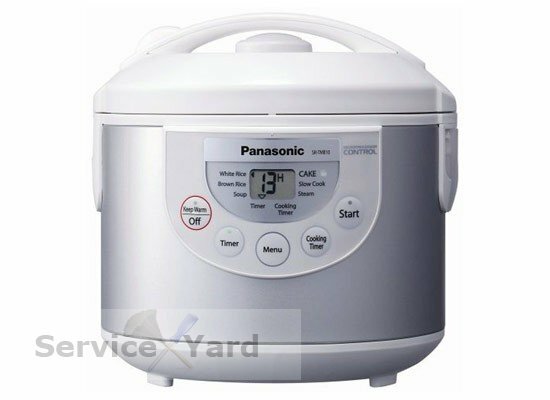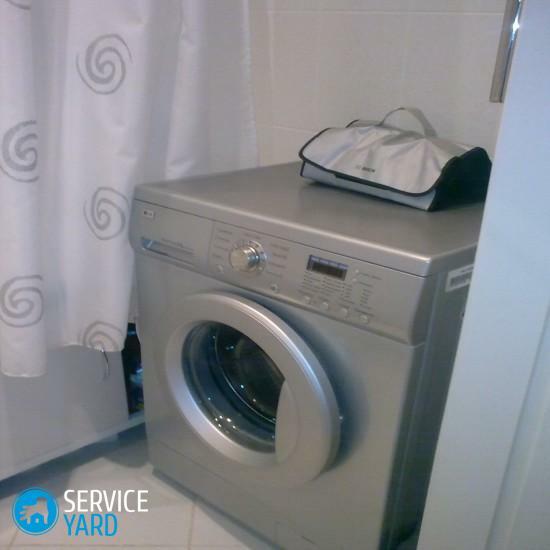All housewives love cleanliness in the house. At the same time, not everyone knows how to clean the tiles in the bathroom, and can choose the best ways to remove various contaminants. This makes it much more difficult to clean tough stains. We offer you to get acquainted with the main types of cleaners and the procedure for their use.
Read in the article
- 1 Cleaning ceramic tiles with special cleaners
- 2 How to wash tiles with improvised detergents
- 2.1 Dish or glass detergents
- 2.2 Soda, vinegar, or citric acid
- 2.3 Bleach, ammonia or hydrogen peroxide solution
- 3 We clean the tiles with a melamine sponge
- 4 Cleaning tiles with a steam cleaner
- 5 How to clean bathroom tiles: the best ways for different types of dirt
- 5.1 Soap streaks and limescale
- 5.2 Mold, mildew and rust
- 6 How to wash different types of tiles
- 6.1 Glossy, matte and embossed tiles
- 6.2 Floor tiles
- 7 How to clean tile joints
- 8 How to remove stains from tiles after bathroom renovations: topical tips
- 8.1 Adhesive mortar and silicone sealant
- 8.2 Primer, cement and grout
- 9 Preventive measures
Cleaning ceramic tiles with special cleaners
When thinking about how to clean a ceramic surface, you should pay attention to industrial products designed specifically taking into account the characteristics of such a surface.
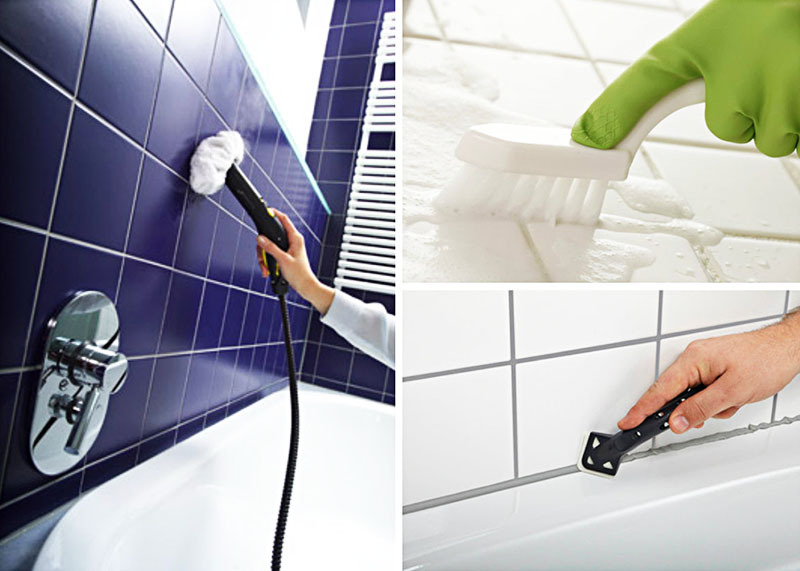
The most popular among housewives are:
- Domestos (Unilever). The thick antibacterial gel is based on sodium hypochlorite. The composition allows you to cope with mold, limescale, characteristic yellowness. To wash the tiles, a solution is prepared, consisting of 5 liters of water and 60 ml of Domestos. It is left on the surface for 5 minutes and then washed off.
- Cillit Bang "Anti-flight". A domestic acid-based composition is able to cope with any type of plaque. Apply with extreme caution to glossy surfaces.
- Kraft Zwerg "Tile Cleaner". The German emulsion is developed using nanotechnology. It not only removes dirt, but also restores the lost color and shine, forms a protective film on the surface with an antistatic effect.
- Luxus Professional "Clean Bath". The domestic antibacterial spray is environmentally friendly. Restores the lost shine. Easy to rinse without streaking. Copes with grease, mold, lime deposits.
- Mellerud for tile and stone. The composition, which is based on phosphoric acid, easily copes with limescale.
- HG for cleaning glossy tiles. The product is manufactured in the Netherlands. Allows for high-quality cleaning of glossy ceramic tiles.
- Kiilto Clean for tiles. The Finnish preparation cleans well limescale, rust, cement residues, since it is based on oxalic acid. Suitable for glazed surfaces.
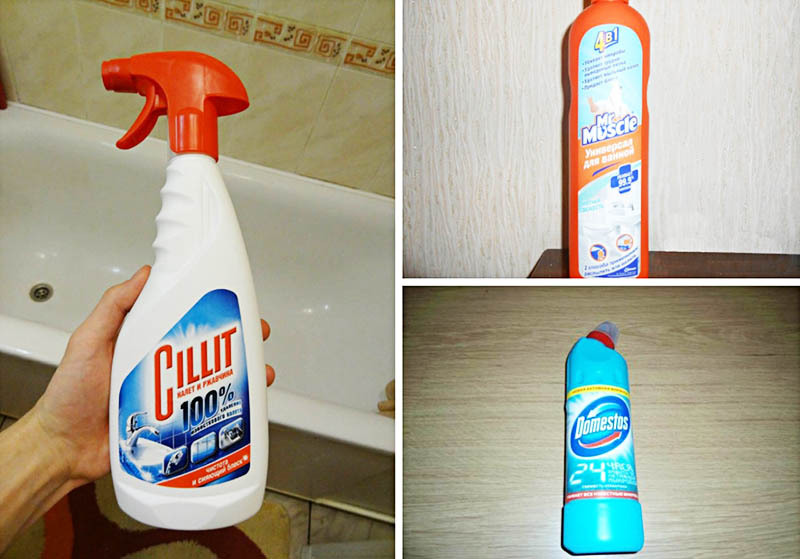
How to wash tiles with improvised detergents
If special products are not available, you can use available detergents. Most of the substances are in the kitchen of every housewife and with their help they wash out different dirt. We invite you to get to know them.
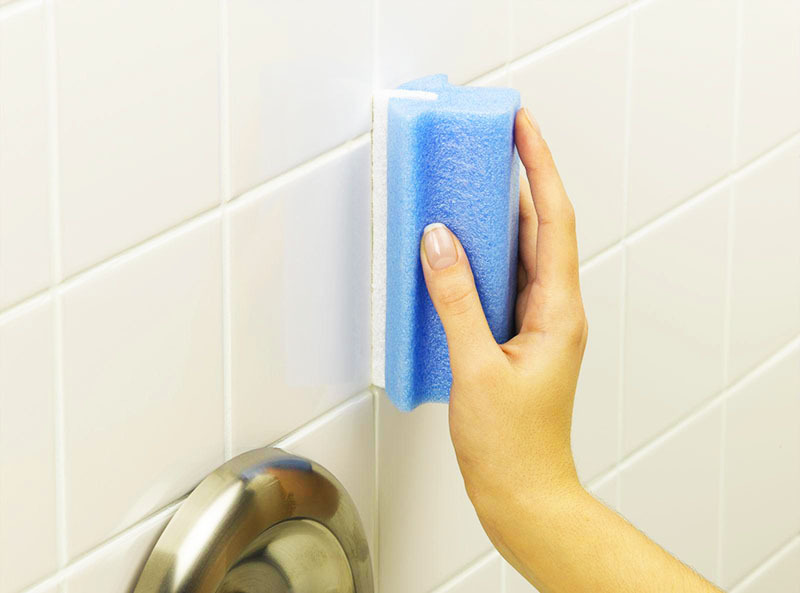
Dish or glass detergents
Dish or glass detergents work well with simple stains. For this, a certain amount of the composition is diluted in warm water. The surface is washed with a sponge and then washed off with water. No streaks remain on the surface.
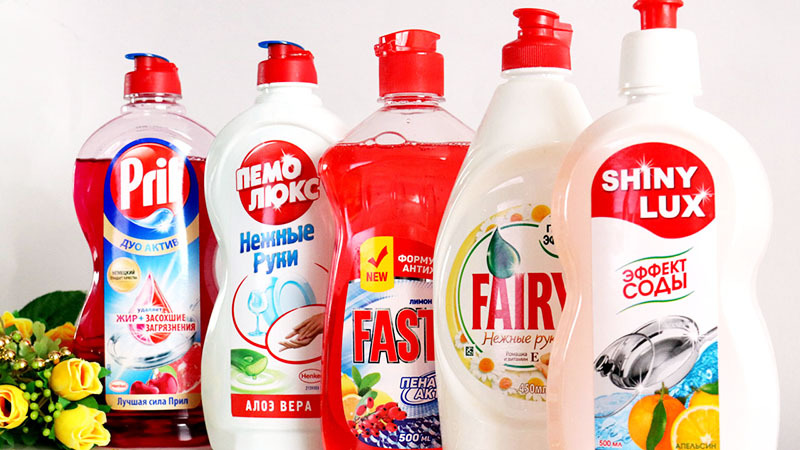
Soda, vinegar, or citric acid
Soda actively fights off grease, fresh rust, any dirt. Before applying the product, the surface is abundantly moistened with water. After that, a certain amount of soda is applied to the wet sponge and they begin to rub the place of pollution. Soda is left on the surface for 15-30 minutes. This time is sufficient for the contamination to soften. After that, the stain will be easy to remove with a brush or sponge.
Attention! When cleaning a glossy surface, it is advisable to use soda ash, which does not contain abrasive particles.
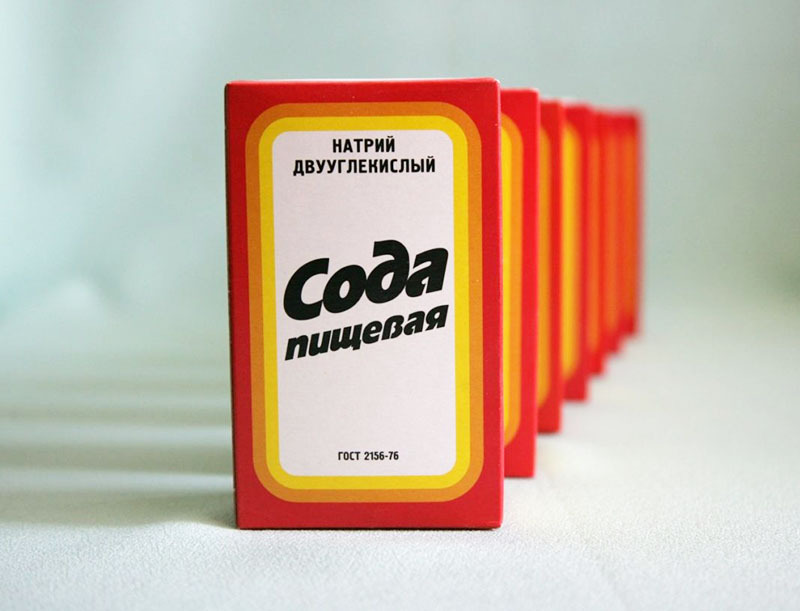
It dissolves the formed dirt well. After removing the composition, no streaks remain on the surface. It is suitable for colored, matte and dark tiles.
Vinegar fights limescale well. To apply the composition to the surface, you can use a sponge or a spray bottle. After that, the surface is wiped off. This is enough to completely remove fresh plaque. If it appeared a long time ago, some salt should be added to the vinegar.
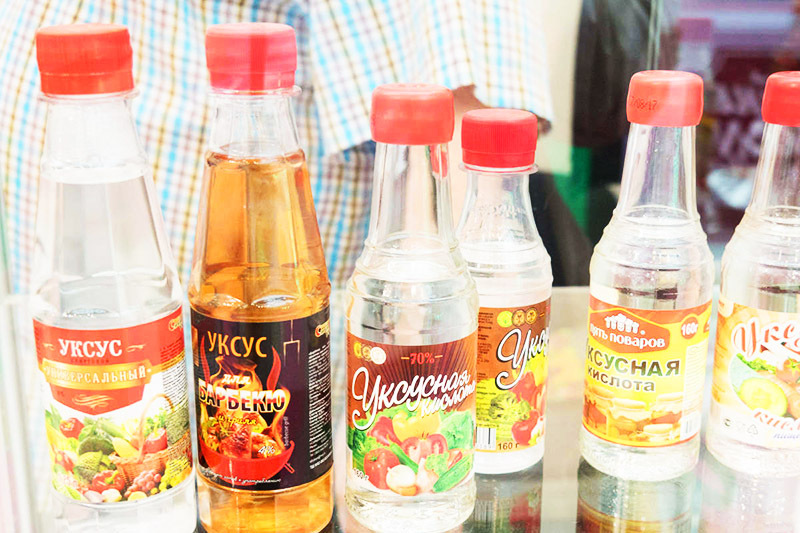
The citric acid will help soften the limescale and lightly whiten the base. The composition is applied to a sponge, rubbed in and washed the tiles. For cleaning fresh plaque, 2-3 minutes is enough.
Attention! To clean glossy tiles, instead of powder, use an aqueous solution or lemon juice.
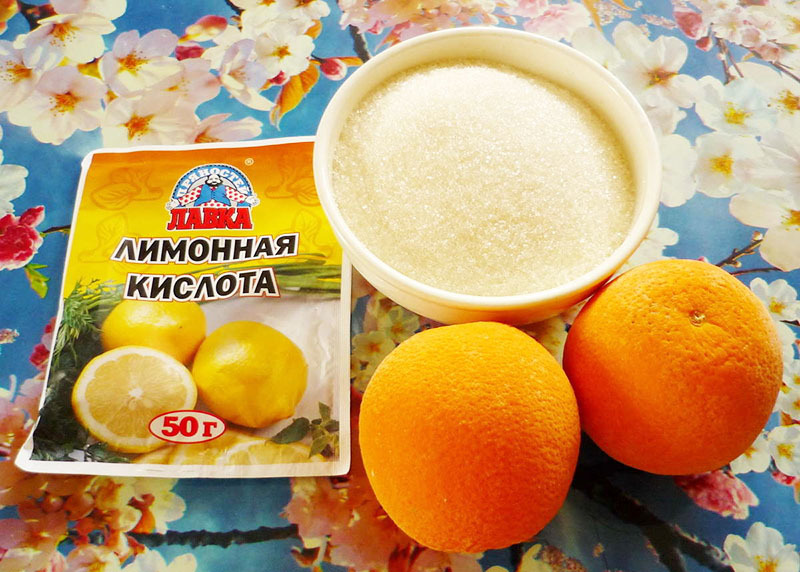
Bleach, ammonia or hydrogen peroxide solution
Bleach can discolor colored tiles. To avoid this, the composition is applied in a diluted form. To do this, add 1 cap of the composition to 2 liters of water. A sponge or napkin is suitable for applying the product.
Attention! Gloves must be worn when adding bleach.
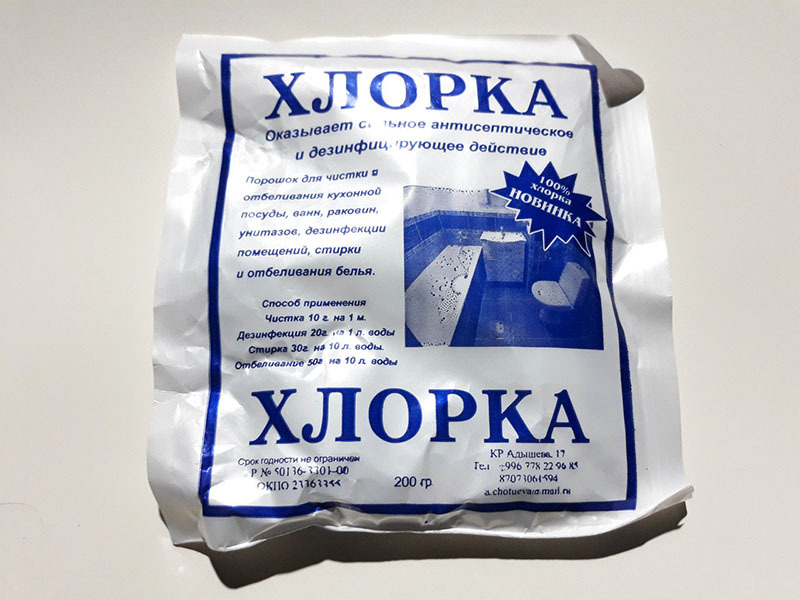
Ammonia is a part of specialized products. At the same time, in its pure form, it does not fight dirt very well. The aqueous solution is ideal for final cleaning of the substrate. To prepare it, add 2 tbsp to a liter of water. tablespoons of ammonia.
Hydrogen peroxide fights color spots, yellowed seams, and traces of dyeing compounds. If the tile has a porous structure, the treatment will have to be repeated several times so that the composition can penetrate into the pores.

We clean the tiles with a melamine sponge
For its manufacture, melamine foam is used, which is able to penetrate any surface irregularities. The sponge copes well with yellow spots, stains, limescale, other types of dirt.
To use this tool, you must:
- wet the sponge;
- wipe the contaminated surface thoroughly.
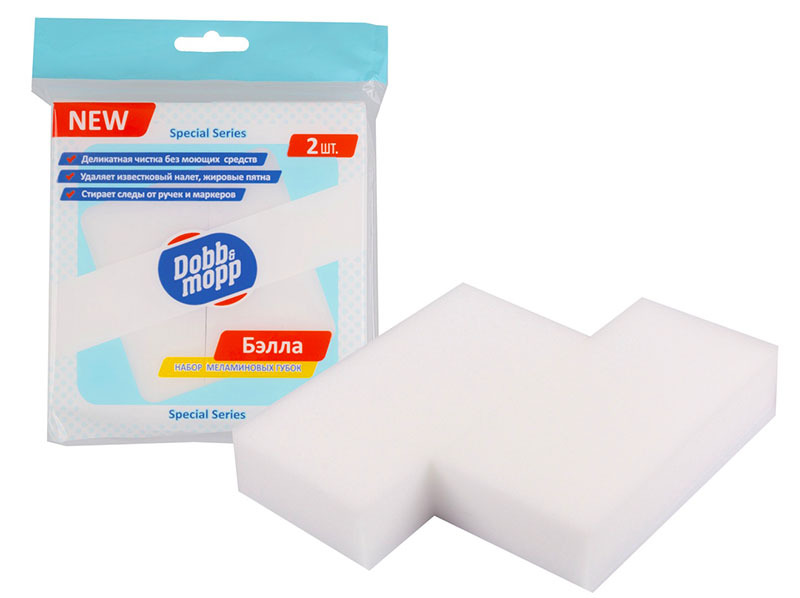
Cleaning tiles with a steam cleaner
Allows you to tackle the toughest stains. Steam is supplied under a sufficiently high pressure, removing mold, grease, and fungus. The special microfiber nozzle absorbs moisture well. After processing with a steam cleaner, no streaks remain on the surface.
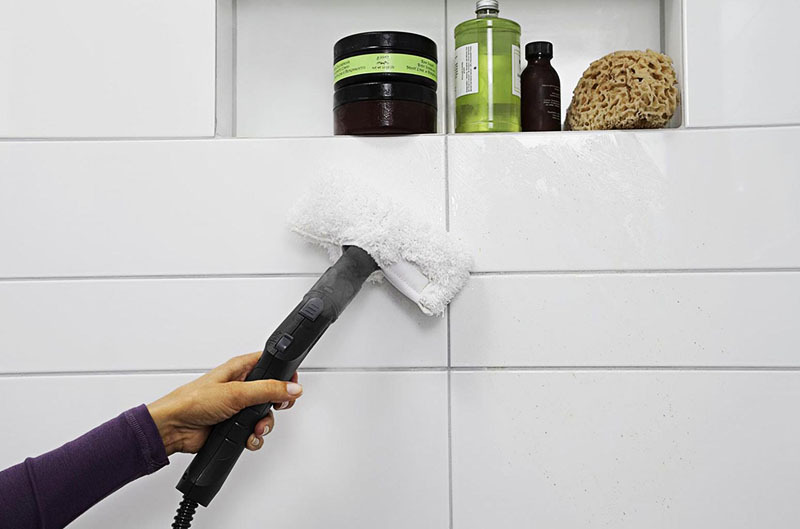
How to clean bathroom tiles: the best ways for different types of dirt
In order for the surface to be perfectly clean, it is imperative to take into account the nature of the pollution. The cleaning procedure and the means used directly depend on this. For each type, the most suitable option should be used.
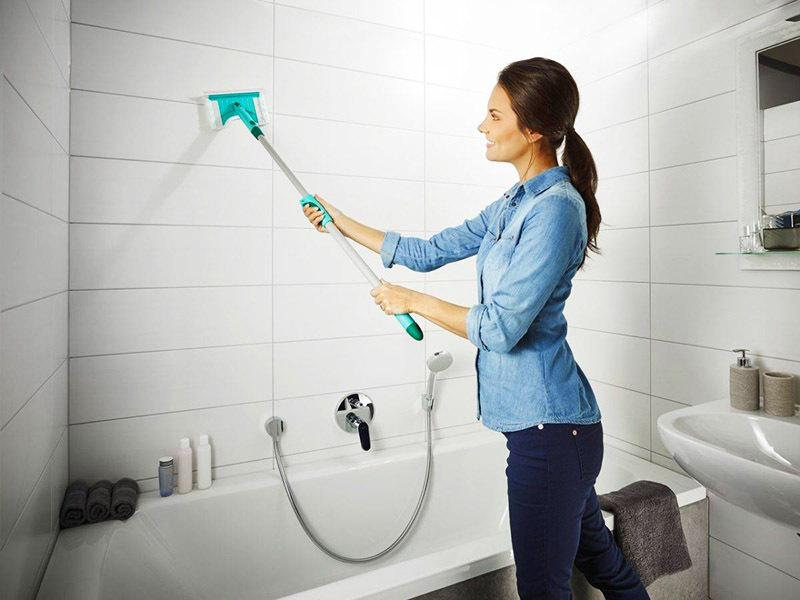
Soap streaks and limescale
You can use any dishwashing detergent to remove soapy streaks. It should be evenly distributed over the base, left for half an hour, and then washed off. The procedure can be repeated if necessary.
Also, a solution of soda, vinegar and ammonia fights well with soapy water. To do this, dissolve in 1.5 liters of water, respectively, 7, 4 and 5 tablespoons of soda, vinegar, ammonia. The liquid is left for 40 minutes and then washed off thoroughly.
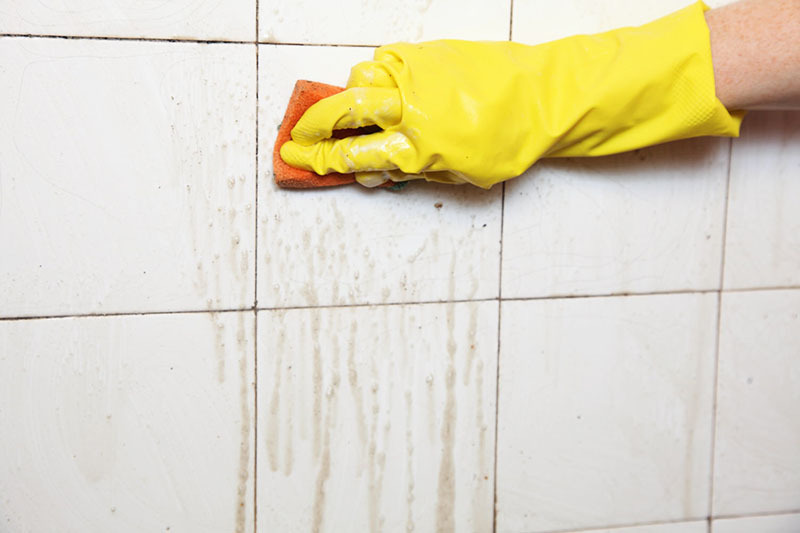
To combat limescale, it is worth using household chemicals.
Will cope with the task:
- Cilit Bang anti-plaque + gloss to be sprayed on the surface.
- Anti-scale with good cleaning properties.
- EMSAL with a wide range of activities.
To prevent damage to the grout, the seams are sealed and only then the composition is applied.
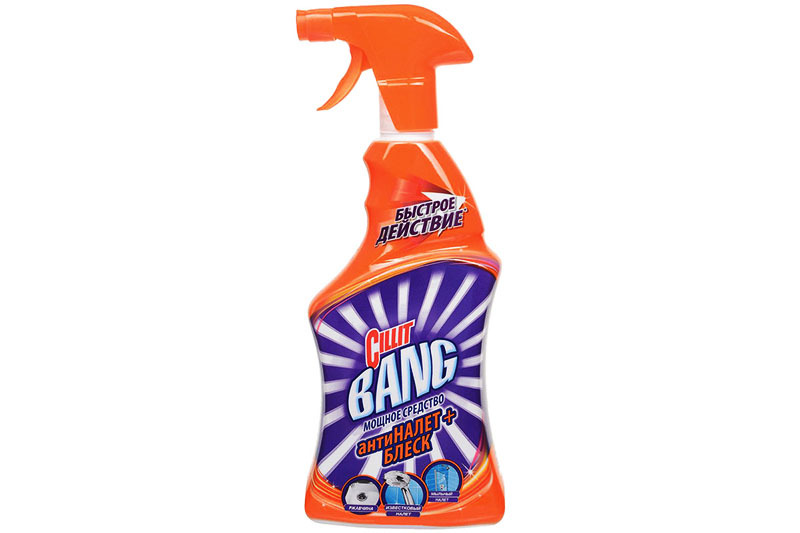
Mold, mildew and rust
To combat mold and mildew, specialized formulations should be used.
They do a good job with the task:
- Cilit Bang, formulated to fight black mold.
- Bionic P2, instantly cleans the surface.
- White. An effective product that can discolor the surface.
- Domestos (Unilever).
From folk remedies, you can use tea tree oil ̶ add it to household chemicals and apply to the surface in its pure form.
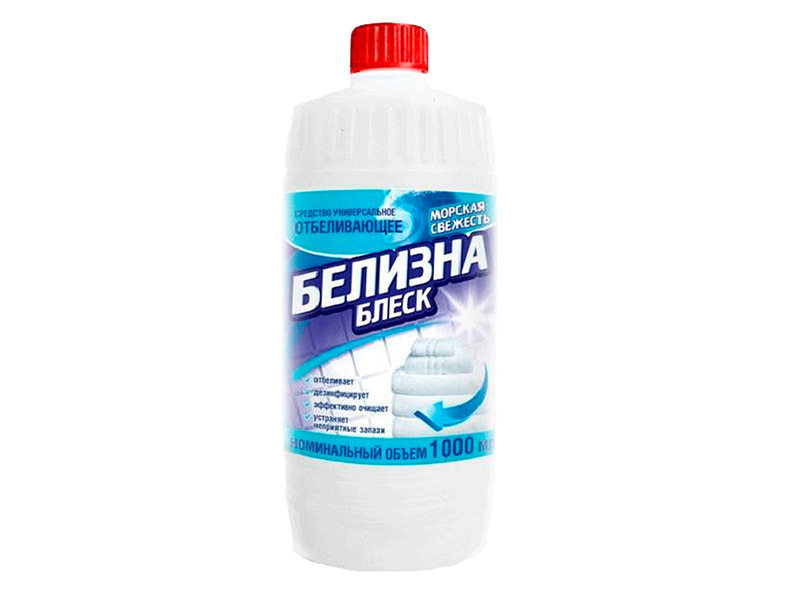
To combat rust, the following agents are used:
- Sanita, which must not be mixed with other household chemicals.
- Cilit, capable of harming health.
- Clean Drops.
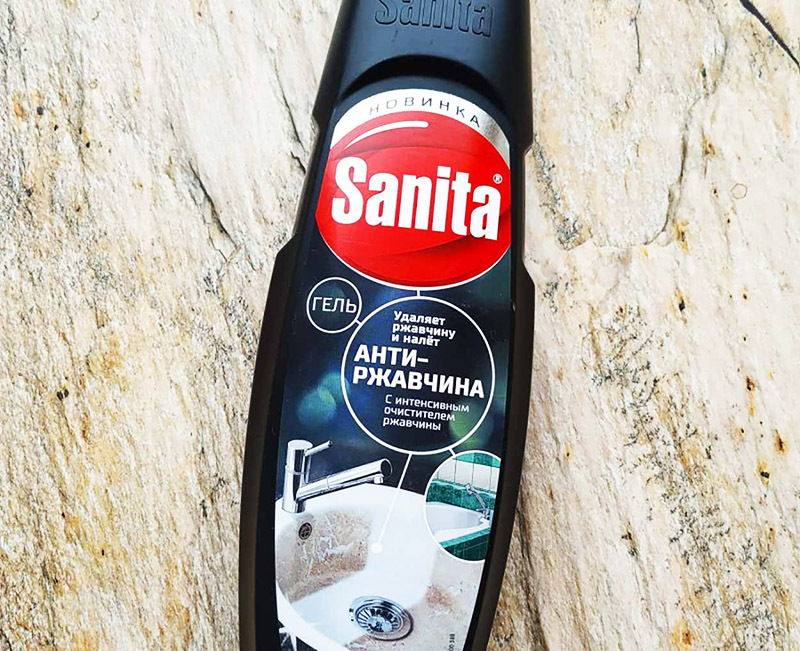
How to wash different types of tiles
The procedure for cleaning a surface largely depends on its type. When choosing one or another method, you should definitely take into account the peculiarities of the material. Otherwise, there is always the possibility of damage to the front surface.
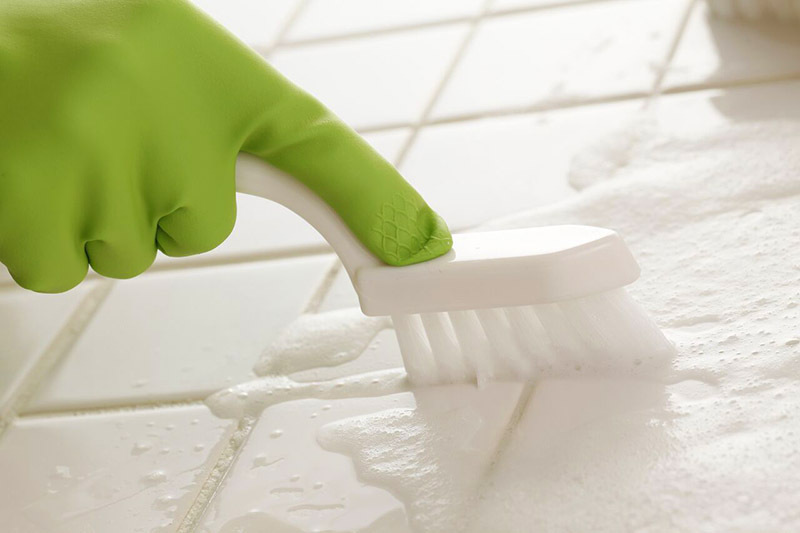
Glossy, matte and embossed tiles
Any dirt and even fingerprints are clearly visible on the glossy surface. To restore the lost shine, housewives often use window cleaning fluids or prefer special formulations designed to clean such bases. To reduce the intensity of plaque formation, the composition is treated with a water-repellent impregnation.
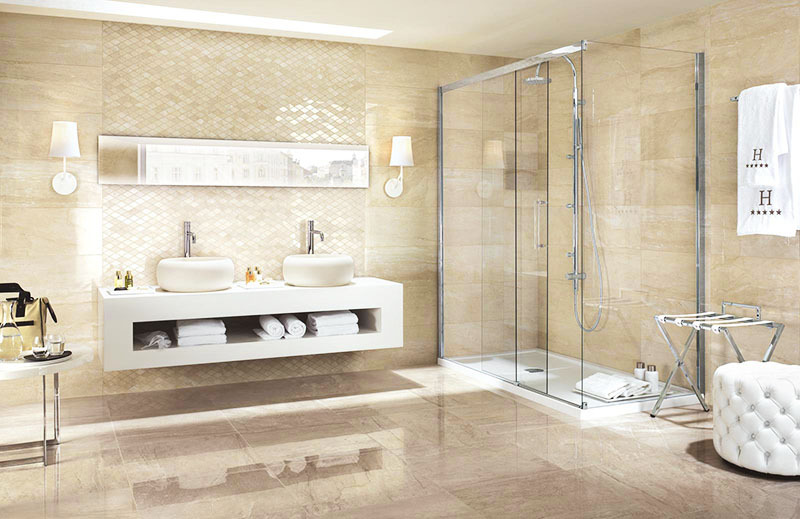
Advice! Treat the glossy surface with a water repellent immediately after installation.
On the matte surface, streaks and traces of dried water are clearly visible, giving it an untidy appearance.
To make a matte tile look perfectly clean, you need:
- Wipe the damp surface with a moisture-absorbent cloth, and then apply glycerin or special polish.
- Use a vinegar solution to clean the surface.
- Wash the surface with a solution of soda ash, which is prepared by diluting 3 tbsp in 5 liters of water. spoons of soda.
It is quite difficult to clean the relief tiles because of the volumetric patterns and designs. Old dirt will have to get rid of over a long period of time. To avoid this, the relief surface should be carefully and promptly looked after.
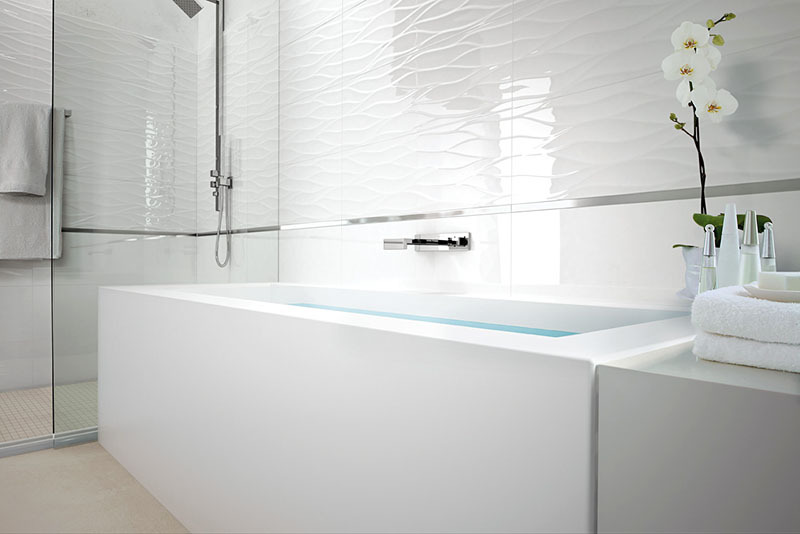
Cleaning should be carried out using special foams and emulsions with good penetrating ability. Stubborn stains should be dealt with with soft, thick-bristled brushes. The glossy surface should be treated with polish to form a protective film.
Floor tiles
This tile surface is usually matte to reduce the likelihood of injury to users. The same products can be used to clean this surface as for matte wall surfaces. However, when choosing a suitable option, it should be borne in mind that such a surface is much more contaminated than walls.
To reduce the rate of contamination, the floor should be swept and washed daily with a cloth dampened with a vinegar solution. This will allow you to quickly get rid of the spots that have appeared on the surface. Old dirt will be more difficult to clean.
Advice! Use a polish designed specifically for floor tiles.
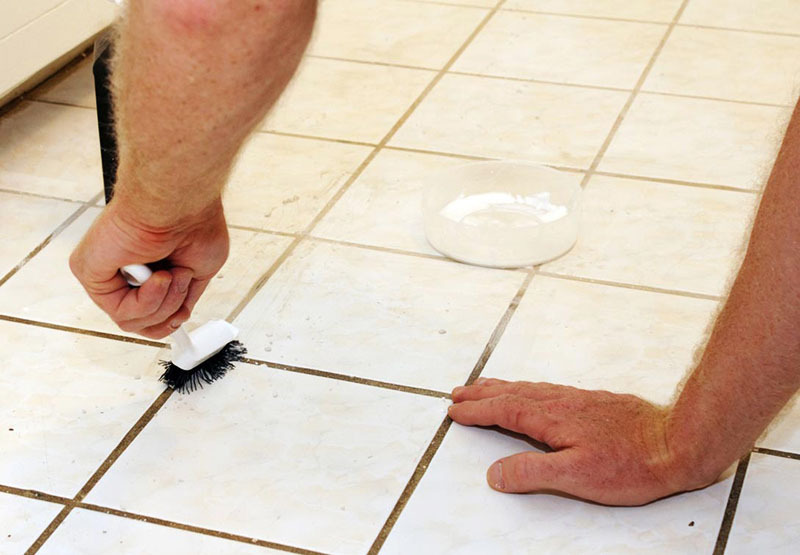
How to clean tile joints
This zone is most intensively polluted. In this case, it is not always possible to use cleaning agents, since under their influence the trowel mixture begins to deteriorate.
To clean the dirt between the tiles, use:
- steam cleaner, processing is carried out without the use of chemicals;
- a toothbrush with which it is convenient to apply the compositions;
- antiseptics and bleaches in the form of a gel or liquid.
Attention! If a large enough area is contaminated and it is impossible to clean it in any way, the grout can be replaced.
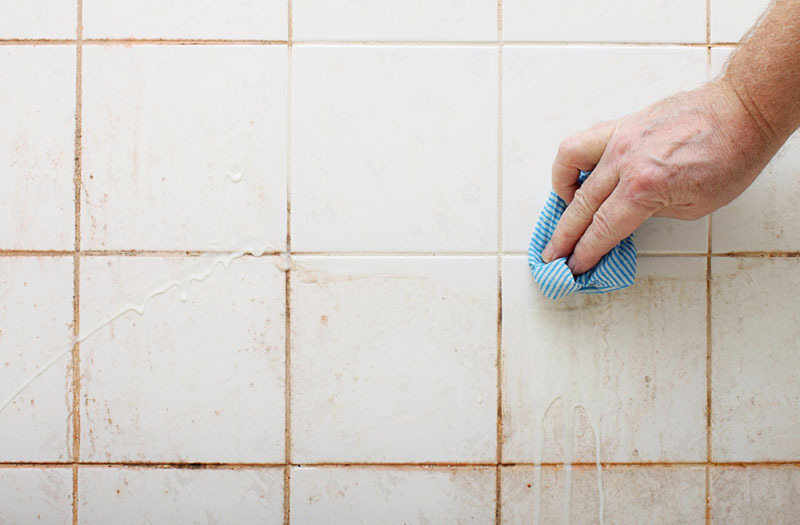
How to remove stains from tiles after bathroom renovations: topical tips
After repairing the bathroom, various compounds that were used in the construction and finishing work often remain on the ceramic surface. To restore the original appearance of ceramics, you need to know what you have to deal with. This will make work easier and more productive.
Adhesive mortar and silicone sealant
It is necessary to get rid of the adhesive composition in a timely manner with a spatula and a damp cloth.
If it is already frozen, it is worth:
- Soak the composition with a napkin soaked in solvent, if epoxy glue was used, and in vinegar, ammonia, acetone, if it is polymer.
- Try to remove dirt mechanically, but proceed with extreme caution.
If silicone sealant remains on the surface, it will be difficult to remove the residue. To remove it, white spirit is used or mechanical cleaning is performed. All this can cause damage to the front surface. To prevent the composition from getting on the tiles, it is worth using masking tape.
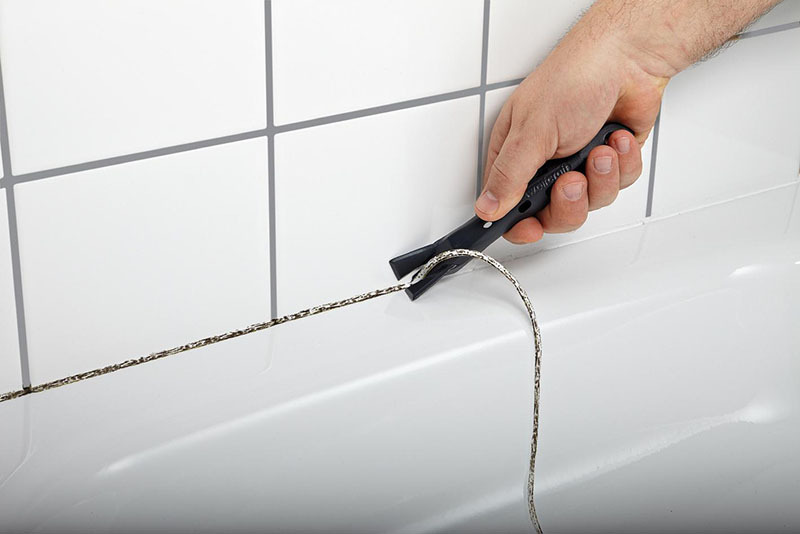
Primer, cement and grout
The primer and cement must be disposed of as soon as the stains appear. The composition is easily washed off with a damp cloth. Dried stains must first be softened. The primer is softened with a layer of fresh primer, and the cement with a cloth soaked in hot water. After the contamination has softened, it is removed with a scraper.
Traces of grout should also be disposed of in a timely manner by wiping the surface with a dry and damp sponge. To fight dry marks, wipe the surface with a damp cloth and then wash with a clean sponge. A special solvent is used to combat epoxy grout.
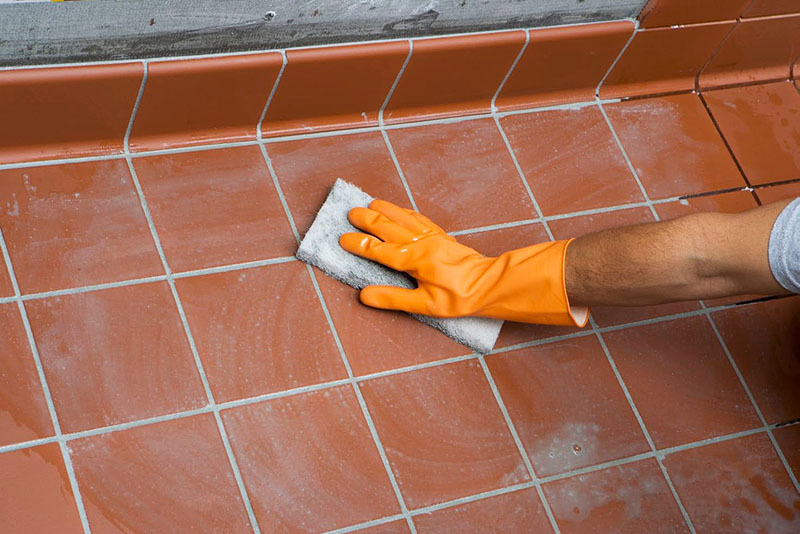
Preventive measures
To spend less time cleaning, it is worth organizing daily maintenance of the ceramic surface.
For this you need:
- Treat the seams with moisture-proof impregnation.
- Wipe all surfaces with a dry cloth daily to completely remove any stains that have appeared.
- Apply polishes correctly. The appearance of streaks is unacceptable, since after drying they will be clearly visible.
- Protect tiles during repairs with a special film.
- Wipe the walls with a special moisture-wicking cloth after each use of the bathroom or shower.
- Monitor the performance of the ventilation system.
Share in the comments what methods you personally use and how satisfied you are with the cleanliness of the tiles in your home.

